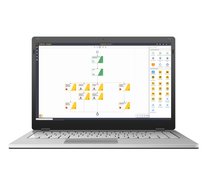The future of process automation is in low-code development
Market growth rate increases by 28 percent annually
Low-code digitalisation platforms are becoming a critical tool for fast and efficient process automation in businesses across industries in 2022. According to market research firm MarketsandMarkets, the market for low-code development platforms will grow at a compound annual growth rate of around 28 percent from US$13.2 billion to US$45.5 billion by 2025. This trend is reinforced by the ongoing IT skills shortage and the need for businesses to adapt processes to new requirements in a flexible and customer-centric way. Low-code is a visual, model-based method for software development and process automation that enables agile and cross-team collaboration on cloud-based applications. With the approach, even users without programming knowledge can independently and quickly map and implement workflows.
"Companies are under pressure to automate processes and business models more and more in order to remain competitive. The low-code approach enables employees from a wide range of departments to quickly design and edit workflows digitally. This relieves the burden on IT resources and increases employee satisfaction," says Axel Ensinger, CEO of JobRouter AG. JobRouter AG is a digitalisation and process specialist headquartered in Mannheim. The German software producer of the low-code digitalisation platform JobRouter® supports companies worldwide in the automation and connection of processes, documents and data.
Smart and customised process automation
With low-code solutions, any work processes in various areas such as finance, HR, administration, purchasing, quality management as well as sales and marketing can be mapped and optimised. The functionalities are diverse and include invoice processing, contract management, employee onboarding, digital personnel files, ticket systems or digital travel expense reports. By means of low-code development, users can, for example, create automated processes adapted to their company in which invoices are scanned by the system, read out and forwarded directly to the respective departments in the company for approval. This minimises sources of error when entering data and relieves employees of monotonous routine tasks.
Low-code digitalisation platform - which is the right one?
The market research company Forrester assumes that European companies will invest between 2.4 and 3.3 billion euros in automation tools such as digitalisation platforms in 2022. The choice is wide: while some providers focus on specific business processes and databases, others are more universal and map the most diverse workflows on a low-code basis. In order for companies to make the right choice for their requirements, they should clarify the following questions in advance:
- Does the low-code platform include all the required features and functions for the planned digitalisation project?
- Is the platform constantly being optimised and developed?
- Is the platform flexible enough to implement unforeseeable requirements at a later date?
- Are there standard interfaces to existing systems (e.g. SAP)?
- Are functionalities for document processing already integrated in the platform or do separate systems have to be connected for this?
Ensinger advises: "For the most efficient and seamless process automation possible, companies should make sure when selecting the digitalisation platform that different technologies and processes are linked with each other and are not mapped as isolated solutions. The platform should also be able to be integrated into any system landscape without restrictions."
Images for download
Short profile JobRouter AG
JobRouter AG is a globally active provider of solutions for digital business transformation and offers a cross-industry low-code digital process automation platform for customers of all sizes. Since 2003 JobRouter has been helping companies to optimize their workflows, to manage their data and documents efficiently and to digitalize their internal and external business processes. The modular components of the JobRouter® technology also allow solutions to be expanded and individually configured according to requirements. As a result, companies receive a comprehensive and tailored system with a large number of agile interfaces.
Together with an international network of over 200 partners and its own branches in Great Britain and the USA, JobRouter AG now supplies over 2.000 customers worldwide, including leading companies such as ABUS, Euromaster, GARTNER, HARIBO, HELMA Eigenheimbau, Klöckner & Co., Prodinger or the University of Bern.
JobRouter AG has its headquarters in Mannheim. Further information is available at https://www.jobrouter.com/.



